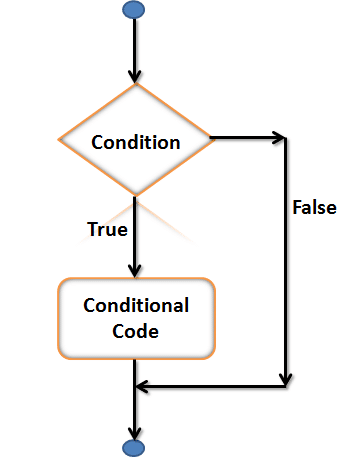Page Contents
IF-ELSE
A great thing about the Scala if construct is that it always returns a result. You can ignore the result as we did in the previous examples, but a more common approach — especially in functional programming — is to assign the result to a variable.
This chapter takes you through If construct in Scala programming.
Flow Chart
The following is a flow chart diagram for If conditional statement.
If Statement
‘if’ statement consists of a Boolean expression followed by one or more statements.
Syntax
The syntax of an ‘if’ statement is as follows.
if(Boolean Expression) {
// Statements will execute if expression evaluates to true.
}
The block of code inside the ‘if’ expression will execute when the boolean expression evaluates to true. If not, the first set of code after the end of the ‘if’ expression ( after the closing curly brace ) will execute.
Example
object Demo extends App {
var x = 5;
if( x > 1 ){
println("Input value is greater than 1");
}
}
Output
Input value is greater than 1
If-else Statement
An ‘if’ statement can be followed by an optional else statement, which executes when the boolean expression evaluates to false.
Syntax
if(Boolean Expression){
// Statements will execute if expression evaluates to true.
} else{
// Statements will execute if expression evaluates to false.
}
Example
object Demo extends App{
var value = 100;
if( value < 50){
println("Input value is less than 50");
} else {
println("Input value is greater than 50");
}
}
Output
Input value is greater than 50
If-else-if-else Statement
An ‘if’ statement can be followed by an optional ‘else if…else‘ statement, which is very useful to test multiple conditions.
Syntax
if(Boolean Expression 1){
// Statements will execute if expression 1 evaluates to true.
} else if(Boolean Expression 2){
// Statements will execute if expression 2 evaluates to true.
} else if(Boolean Expression 3){
// Statements will execute if expression 3 evaluates to true.
} else {
// Executes when the none of the above condition is true.
}
Example
object Demo {
def main(args: Array[String]) {
var value = 100;
if( value == 10 ){
println("Input value is 10");
} else if( value == 20 ){
println("Input value is 20");
} else if( value == 30 ){
println("Input value is 30");
} else{
println("Input value does't match any of the If-Else-If");
}
}
}
Output
Input value does't match any of the If-Else-If
Nested If-Else
It is always legal to nest if-else statements
Syntax
if(Boolean Expression 1){
// Executes when the Boolean expression evaluates to true
if(Boolean Expression 2){
// Executes if the nested Boolean expression evaluates to true
}
}
Example
object Demo extends App{
var x = 100;
var y = 101;
if( x == 100 ){
if( y > 100 ){
println("x is equal to 100 AND y is greater than 100");
}
}
}
Output
x is equal to 100 AND y is greater than 100
